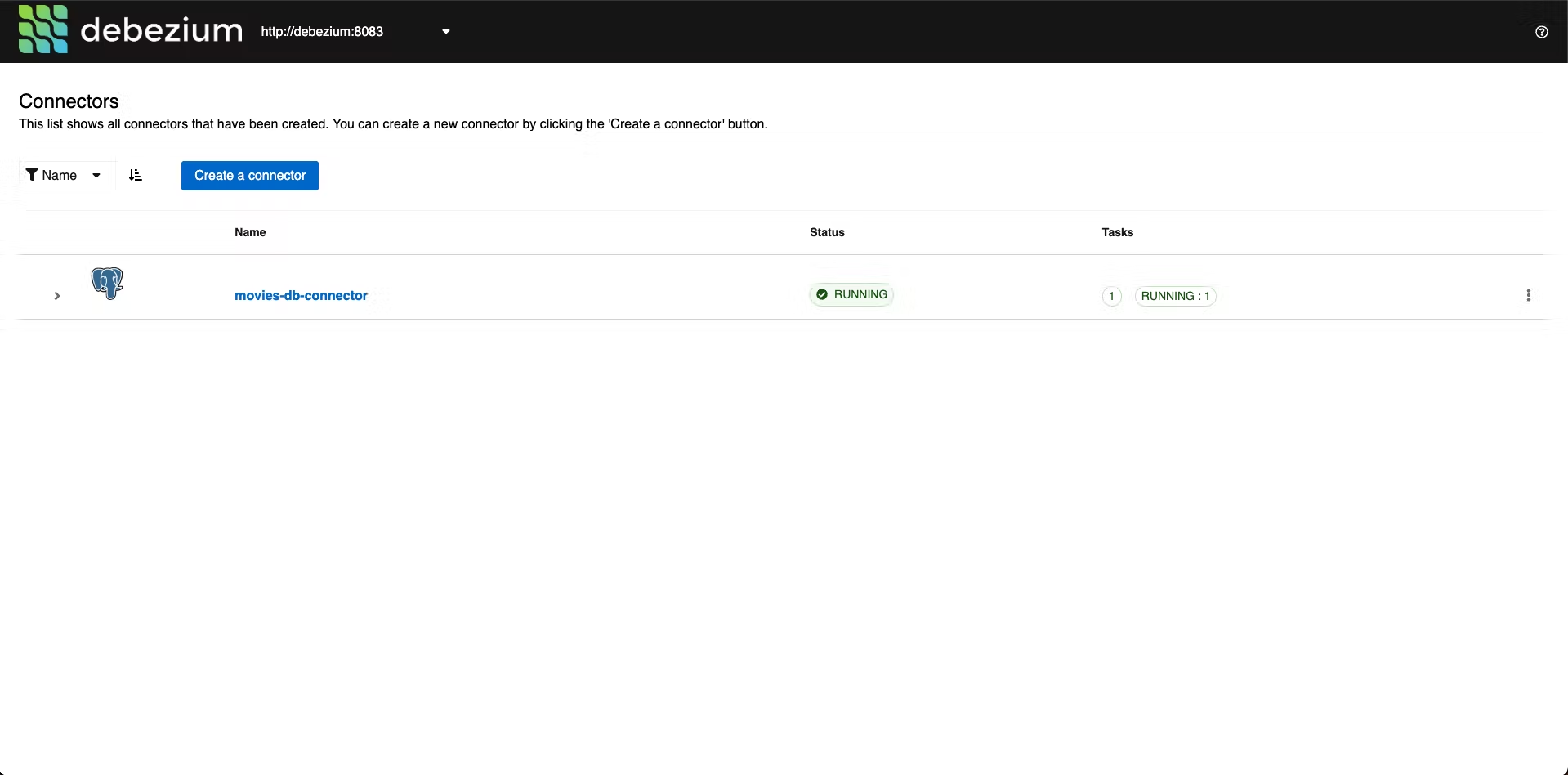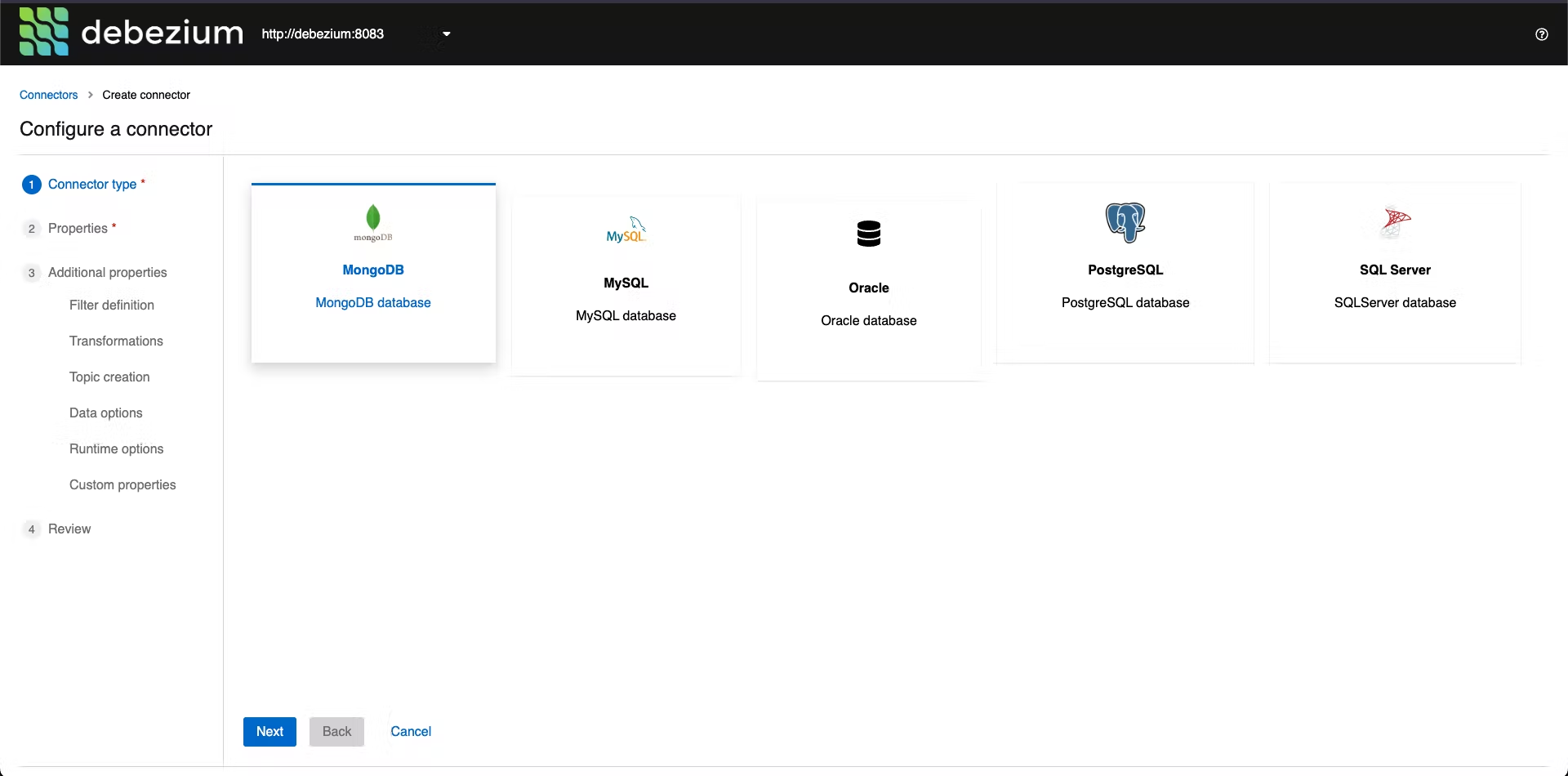This is an addition to my docker-compose setup that allows me to test applications locally and quickly. I like running the services that I am building on my Mac because then it is easy to try any scenarios or replicate the reported bugs also, I think the entire CI/CD duration to deploy the change to the staging/test environment sometimes takes more time for testing small stuff (I am not saying that you should never test services on staging/test env 😅).
I am working with Change Data Capture using Debezium recently and this docker-compose helps me to write the consumer application that will process the changes happening at the DB level.
In this post, I will be setting up the Debezium connector for Postgres with all the changes required to allow Debezium to capture the changes. In addition, I will also provide the details on how to make this configuration on the AWS RDS if you are going to use the Debezium Connector for your next project.
The following services would be needed to make the Debezium and Postgres work locally::
- Kafka Broker -
localhost:9092 - Zookeeper -
localhost:2181 - Postgres -
localhost:5432 - Debezium Connector -
localhost:8083 - Schema Registry -
localhost:8081 - Debezium UI -
localhost:8080 - Rest-Proxy - This is optional, but helps with checking cluster metadata, topics etc -
localhost:8082
Starting Docker Compose
Below is the docker-compose file I use to start the stack::
version: '3.9'
services:
zookeeper:
image: confluentinc/cp-zookeeper:7.3.1
hostname: zookeeper
container_name: zookeeper
ports:
- '2181:2181'
environment:
ZOOKEEPER_CLIENT_PORT: 2181
ZOOKEEPER_TICK_TIME: 2000
healthcheck:
test: echo srvr | nc zookeeper 2181 || exit 1
start_period: 10s
retries: 20
interval: 10s
broker:
image: confluentinc/cp-kafka:7.3.1
hostname: broker
container_name: broker
depends_on:
zookeeper:
condition: service_healthy
ports:
- '29092:29092'
- '9092:9092'
- '9101:9101'
environment:
KAFKA_BROKER_ID: 1
KAFKA_ZOOKEEPER_CONNECT: 'zookeeper:2181'
KAFKA_LISTENER_SECURITY_PROTOCOL_MAP: PLAINTEXT:PLAINTEXT,PLAINTEXT_HOST:PLAINTEXT
KAFKA_ADVERTISED_LISTENERS: PLAINTEXT://broker:29092,PLAINTEXT_HOST://localhost:9092
KAFKA_OFFSETS_TOPIC_REPLICATION_FACTOR: 1
KAFKA_TRANSACTION_STATE_LOG_MIN_ISR: 1
KAFKA_TRANSACTION_STATE_LOG_REPLICATION_FACTOR: 1
KAFKA_GROUP_INITIAL_REBALANCE_DELAY_MS: 0
KAFKA_AUTO_CREATE_TOPICS_ENABLE: 'true'
KAFKA_JMX_PORT: 9101
KAFKA_JMX_HOSTNAME: localhost
healthcheck:
test: nc -z localhost 9092 || exit -1
start_period: 15s
interval: 5s
timeout: 10s
retries: 10
debezium:
image: debezium/connect:latest
restart: always
container_name: debezium
hostname: debezium
depends_on:
postgres:
condition: service_healthy
broker:
condition: service_healthy
ports:
- '8083:8083'
environment:
BOOTSTRAP_SERVERS: broker:29092
GROUP_ID: 1
CONFIG_STORAGE_TOPIC: connect_configs
STATUS_STORAGE_TOPIC: connect_statuses
OFFSET_STORAGE_TOPIC: connect_offsets
KEY_CONVERTER: org.apache.kafka.connect.json.JsonConverter
VALUE_CONVERTER: org.apache.kafka.connect.json.JsonConverter
ENABLE_DEBEZIUM_SCRIPTING: 'true'
healthcheck:
test:
[
'CMD',
'curl',
'--silent',
'--fail',
'-X',
'GET',
'http://localhost:8083/connectors',
]
start_period: 10s
interval: 10s
timeout: 5s
retries: 5
schema-registry:
image: confluentinc/cp-schema-registry:7.3.1
hostname: schema-registry
container_name: schema-registry
depends_on:
broker:
condition: service_healthy
ports:
- '8081:8081'
environment:
SCHEMA_REGISTRY_HOST_NAME: schema-registry
SCHEMA_REGISTRY_KAFKASTORE_BOOTSTRAP_SERVERS: broker:29092
SCHEMA_REGISTRY_LISTENERS: http://0.0.0.0:8081
healthcheck:
start_period: 10s
interval: 10s
retries: 20
test: curl --user superUser:superUser --fail --silent --insecure http://localhost:8081/subjects --output /dev/null || exit 1
rest-proxy:
image: confluentinc/cp-kafka-rest:7.3.1
depends_on:
broker:
condition: service_healthy
ports:
- '8082:8082'
hostname: rest-proxy
container_name: rest-proxy
environment:
KAFKA_REST_HOST_NAME: rest-proxy
KAFKA_REST_BOOTSTRAP_SERVERS: 'broker:29092'
KAFKA_REST_LISTENERS: 'http://0.0.0.0:8082'
debezium-ui:
image: debezium/debezium-ui:latest
restart: always
container_name: debezium-ui
hostname: debezium-ui
depends_on:
debezium:
condition: service_healthy
ports:
- '8080:8080'
environment:
KAFKA_CONNECT_URIS: http://debezium:8083
postgres:
image: postgres:latest
restart: always
container_name: postgres
hostname: postgres
ports:
- '5432:5432'
environment:
POSTGRES_USER: postgres
POSTGRES_PASSWORD: postgres
POSTGRES_DB: movies_db
command: ['postgres', '-c', 'wal_level=logical']
healthcheck:
test: ['CMD', 'psql', '-U', 'postgres', '-c', 'SELECT 1']
interval: 10s
timeout: 5s
retries: 5
volumes:
- ./scripts:/docker-entrypoint-initdb.dFor Debezium to work with Postgres, Postgres needs to have the logical replication enabled and if you observe the line command: ["postgres", "-c", "wal_level=logical"] we are configuring the Postgres DB to start with wal_level as logical.
If we don't do this step, then debezium would not be able to capture the changes happening on Postgres. The default wal_level is replica.
Now we have our docker-compose file ready let's start all the service
docker compose -f docker-compose.yml up -d
[+] Running 8/8
⠿ Network postgres_default Created 0.1s
⠿ Container postgres Healthy 12.8s
⠿ Container zookeeper Healthy 11.8s
⠿ Container broker Healthy 22.6s
⠿ Container debezium Healthy 44.2s
⠿ Container rest-proxy Started 23.1s
⠿ Container schema-registry Started 23.1s
⠿ Container debezium-ui Started 44.6sAs we could see all the containers have started without any errors. If you are running this command for the first time it would take some time to download all the docker images but the later executions will be faster
Configure Postgres Connector
At this point, our Debezium connector is running but it doesn't have any task to read changes happening on the Postgres DB. We need to register the Postgres connector using HTTP API so that debezium could read the transaction logs from the server.
It's easy to register the connector, there is a sample connector config already present in the repo. Execute the below curl and we would see the connector registered
curl -X POST --location "http://localhost:8083/connectors" -H "Content-Type: application/json" -H "Accept: application/json" -d @connector.json{
"config": {
"connector.class": "io.debezium.connector.postgresql.PostgresConnector",
"database.dbname": "movies_db",
"database.history.kafka.bootstrap.servers": "kafka:9092",
"database.history.kafka.topic": "schema-changes.movies",
"database.hostname": "postgres",
"database.password": "postgres",
"database.port": "5432",
"database.server.name": "postgres",
"database.user": "postgres",
"name": "movies-db-connector",
"plugin.name": "pgoutput",
"table.include.list": "public.movies",
"tasks.max": "1",
"topic.creation.default.cleanup.policy": "delete",
"topic.creation.default.partitions": "1",
"topic.creation.default.replication.factor": "1",
"topic.creation.default.retention.ms": "604800000",
"topic.creation.enable": "true",
"topic.prefix": "postgres"
},
"name": "movies-db-connector",
"tasks": [],
"type": "source"
}List Kafka Topics
If there was no issue running the above steps we could confirm that our connector is working fine by checking if the topic is created for movies table by the connector.
❯ kafka-topics --bootstrap-server localhost:9092 --list
__consumer_offsets
_schemas
connect_configs
connect_offsets
connect_statuses
postgres.public.moviesAs you could see from the above command we have postgres.public.movies a topic created by debezium. The topic name pattern is of a type topic_prefix_config.schema.table so the prefix is what we configured and the other part is fetched by the debezium from the database schema
Reading the data
Now we know that the topic is created next we would check the data available on the topic.
There would be data present in the topic because when the connector starts it takes an initial snapshot of the database table. This is a default config named snapshot.mode which we didn't configure but is set to initial which means that the connector will do a snapshot on the initial run when it doesn't find the last known offset from the transaction log available for the database server, to understand more about this configuration and others read more here.
kafka-console-consumer --bootstrap-server localhost:9092 --topic postgres.public.movies --from-beginning
{
"schema": {
"type": "struct",
"fields": [
{
"type": "struct",
"fields": [
{
"type": "int64",
"optional": false,
"field": "id"
},
{
"type": "string",
"optional": false,
"field": "title"
},
{
"type": "int32",
"optional": false,
"field": "year"
},
{
"type": "string",
"optional": false,
"field": "director"
},
{
"type": "struct",
"fields": [
{
"type": "int32",
"optional": false,
"field": "scale"
},
{
"type": "bytes",
"optional": false,
"field": "value"
}
],
"optional": false,
"name": "io.debezium.data.VariableScaleDecimal",
"version": 1,
"doc": "Variable scaled decimal",
"field": "rating"
}
],
"optional": true,
"name": "postgres.public.movies.Value",
"field": "before"
},
{
"type": "struct",
"fields": [
{
"type": "int64",
"optional": false,
"field": "id"
},
{
"type": "string",
"optional": false,
"field": "title"
},
{
"type": "int32",
"optional": false,
"field": "year"
},
{
"type": "string",
"optional": false,
"field": "director"
},
{
"type": "struct",
"fields": [
{
"type": "int32",
"optional": false,
"field": "scale"
},
{
"type": "bytes",
"optional": false,
"field": "value"
}
],
"optional": false,
"name": "io.debezium.data.VariableScaleDecimal",
"version": 1,
"doc": "Variable scaled decimal",
"field": "rating"
}
],
"optional": true,
"name": "postgres.public.movies.Value",
"field": "after"
},
{
"type": "struct",
"fields": [
{
"type": "string",
"optional": false,
"field": "version"
},
{
"type": "string",
"optional": false,
"field": "connector"
},
{
"type": "string",
"optional": false,
"field": "name"
},
{
"type": "int64",
"optional": false,
"field": "ts_ms"
},
{
"type": "string",
"optional": true,
"name": "io.debezium.data.Enum",
"version": 1,
"parameters": {
"allowed": "true,last,false,incremental"
},
"default": "false",
"field": "snapshot"
},
{
"type": "string",
"optional": false,
"field": "db"
},
{
"type": "string",
"optional": true,
"field": "sequence"
},
{
"type": "string",
"optional": false,
"field": "schema"
},
{
"type": "string",
"optional": false,
"field": "table"
},
{
"type": "int64",
"optional": true,
"field": "txId"
},
{
"type": "int64",
"optional": true,
"field": "lsn"
},
{
"type": "int64",
"optional": true,
"field": "xmin"
}
],
"optional": false,
"name": "io.debezium.connector.postgresql.Source",
"field": "source"
},
{
"type": "string",
"optional": false,
"field": "op"
},
{
"type": "int64",
"optional": true,
"field": "ts_ms"
},
{
"type": "struct",
"fields": [
{
"type": "string",
"optional": false,
"field": "id"
},
{
"type": "int64",
"optional": false,
"field": "total_order"
},
{
"type": "int64",
"optional": false,
"field": "data_collection_order"
}
],
"optional": true,
"name": "event.block",
"version": 1,
"field": "transaction"
}
],
"optional": false,
"name": "postgres.public.movies.Envelope",
"version": 1
},
"payload": {
"before": null,
"after": {
"id": 1,
"title": "The Shawshank Redemption",
"year": 1994,
"director": "Frank Darabont",
"rating": {
"scale": 1,
"value": "XQ=="
}
},
"source": {
"version": "2.1.1.Final",
"connector": "postgresql",
"name": "postgres",
"ts_ms": 1675103983563,
"snapshot": "first",
"db": "movies_db",
"sequence": "[null,\"26612016\"]",
"schema": "public",
"table": "movies",
"txId": 744,
"lsn": 26612016,
"xmin": null
},
"op": "r",
"ts_ms": 1675103983739,
"transaction": null
}
}
----- more data ommitted for readability purpose -----Cleanup
By running the below command all the services will be shut down and the resources would be released
docker compose -f docker-compose.yml -v downHere we specify -v option to also remove any volumes created by the docker-compose, this will also free the disk space allocated to the containers
Debezium UI
Debezium also provides a control dashboard. You could use it to add a new connector instead of using the REST API. The dashboard also provides the functionality to Pause or Restart the debezium task and also to delete the connector
Go to http://localhost:8080 and you will be able to access the dashboard as shown below

The Dashboard also allows you to add new connectors for other database providers

AWS RDS
Setting up docker-compose is easy because everything is local and we could use the configuration described by the Postgres documentation.
On AWS, it's a different story, on AWS we have to configure rds.logical_replication property in the parameter groups of your Postgres instance. The default value for this property is 0 which means the logical replication is disabled by default, however, setting it to 1 will enable the logical replication. An important thing that you should know is that when you change this property on AWS you would need to restart your AWS RDS Postgres instance. If your application is in production that means you would need some downtime to enable the replication. You could read more about this and the steps to do it in AWS RDS here
This brings us to the end of this small and quick setup of Postgres and Debezium using Docker Compose. Hope, next time you are building any CDC-related consumer this docker-compose setup will help you to run the infrastructure locally without any hassle.
If you like the blog, please don't forget to like the post, follow me on Medium also don't forget to subscribe on Medium.
